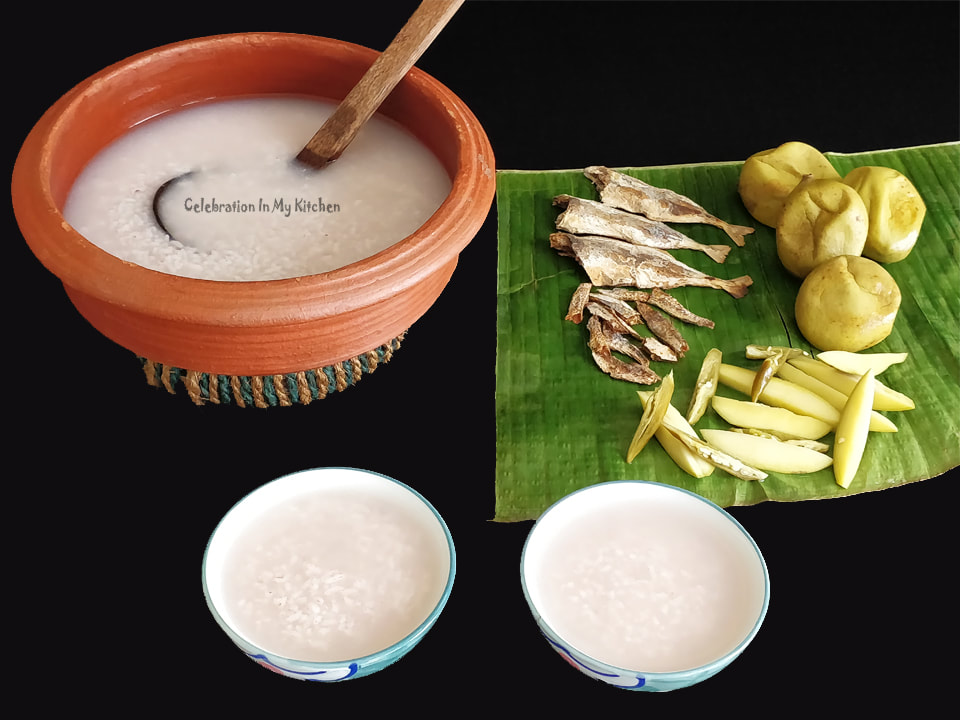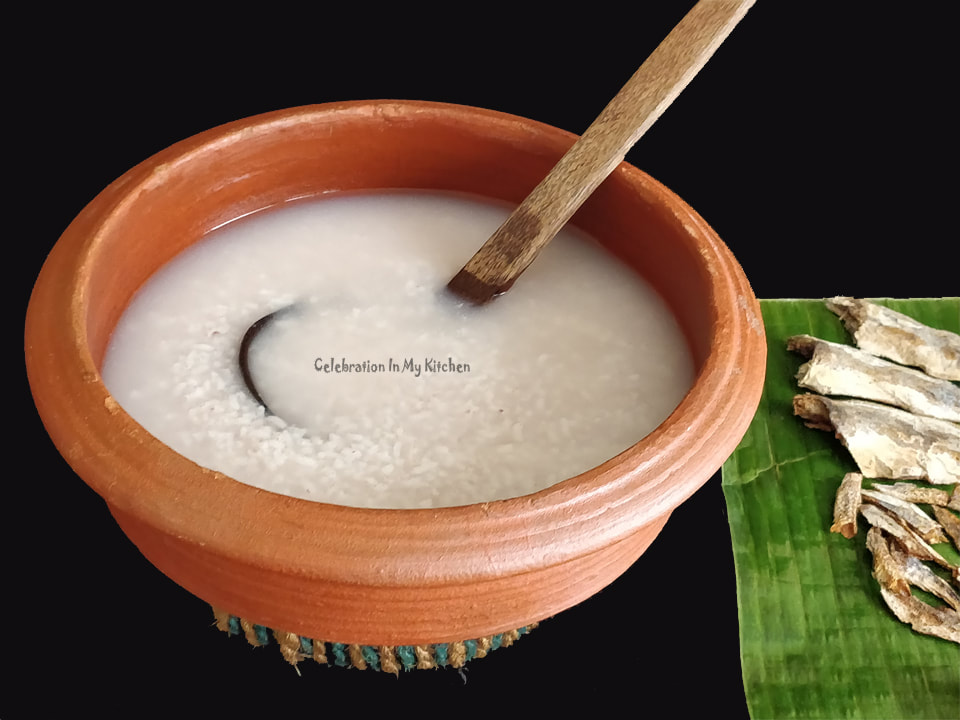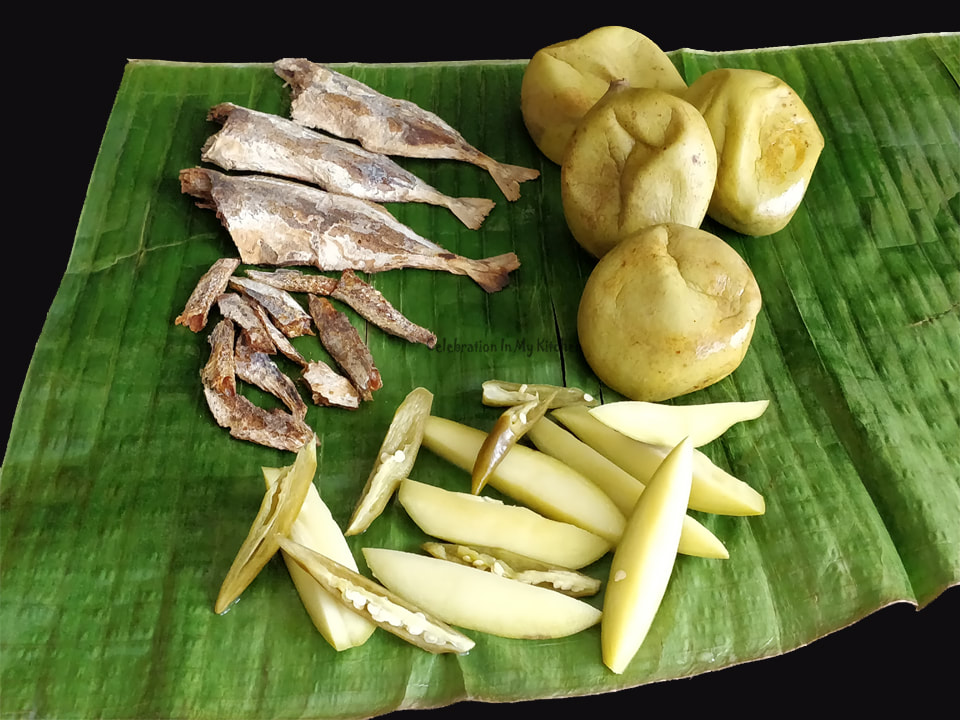Summer vacation at my paternal grandfather's house in Goa were filled with fond memories. One was looking forward to the mid-morning traditional pez or canjee. After breakfast, a moddki (pot) filled with red parboiled rice, water and salt would be simmering away over wood fire. The rice cooked until soft and supple. Simultaneously, kharyacho (dried salted fish) usually mackerels were roasted by burying them under the hot embers below the pot. Checked and pushed out with a wooden stick to ensure that they are perfectly charred and done. Using a knife, the outer skin scraped off, the fish either kept whole or shredded into pieces and tossed in coconut oil. A doulo (ladle with a coconut shell and bamboo stick handle) used to serve canjee in a kanso (copper bowl). Besides salted fish, other accompaniments enjoyed are chepnim or tora shiro (tender whole raw mango or slices pickled in brine). Of course, my favourite is to have canjee with atoilole koddi or kalchi koddi (concentrated leftover or previous day's curry). The warm gruel with either the tasty curry, salted fish or pickle is definitely satisfying and filling.
Pez is also consumed by Catholic Goans on Ash Wednesday and Good Friday (days of fasting and abstinence). Often, given to workers tirelessly working out in the fields under the hot sun. Thus, hydrating them, providing the energy and nutrition required until lunch time. This simple, comfort food is administered to the sick and convalescing too. Easy to digest, nutritious, aiding to regain back the strength and any loss of appetite.
At the Chapel of Jesus Nazareth, Siridao, Goa, Pejechem Fest is always celebrated on the 1st Sunday after Easter. After Mass, pez is served to all free of cost. People have to only buy the maittul or mattul (earthen bowl) and pickle from the vendors. The blessed pez is said to have a medicinal effect of healing. Before giving the crowd, pez is ladled out at the shim (boundary) as a custom offering for the dead souls.
Pez is also consumed by Catholic Goans on Ash Wednesday and Good Friday (days of fasting and abstinence). Often, given to workers tirelessly working out in the fields under the hot sun. Thus, hydrating them, providing the energy and nutrition required until lunch time. This simple, comfort food is administered to the sick and convalescing too. Easy to digest, nutritious, aiding to regain back the strength and any loss of appetite.
At the Chapel of Jesus Nazareth, Siridao, Goa, Pejechem Fest is always celebrated on the 1st Sunday after Easter. After Mass, pez is served to all free of cost. People have to only buy the maittul or mattul (earthen bowl) and pickle from the vendors. The blessed pez is said to have a medicinal effect of healing. Before giving the crowd, pez is ladled out at the shim (boundary) as a custom offering for the dead souls.
Pez or Canjee
(Serves 6)
Ingredients:
1 cup red parboiled rice
10 cups warm water
salt
Method:
Clean, wash rice until water runs clear. Transfer to a pot with 6 cups water. With the lid ajar, cook for 30 minutes until rice is soft and supple.
Add the balance 4 cups water to adjust consistency. Include more water, if desired.
Mix in salt not too much since accompaniments are salty.
Serve hot with roasted salted fish, chepnim, tora shiro or atoilole koddi.
Note:
(Serves 6)
Ingredients:
1 cup red parboiled rice
10 cups warm water
salt
Method:
Clean, wash rice until water runs clear. Transfer to a pot with 6 cups water. With the lid ajar, cook for 30 minutes until rice is soft and supple.
Add the balance 4 cups water to adjust consistency. Include more water, if desired.
Mix in salt not too much since accompaniments are salty.
Serve hot with roasted salted fish, chepnim, tora shiro or atoilole koddi.
Note:
- Depending on the size or type of grain used, cooking time may vary either less or more.




